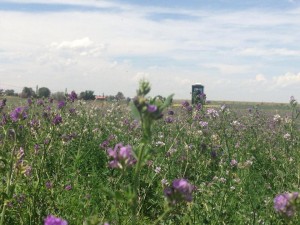This week I made the trip to Waco to speak at the Backlands Income Growth Conference on landowner rights and on grazing leases. It was a great conference and I appreciate the opportunity to speak and to visit with producers. Welcome to any new followers from the BIG Conference! Here are some ag law stories in the news this week.
* Court Dismisses Farm Bureau Lawsuit Regarding Farmers Privacy. You may recall from this prior blog that the American Farm Bureau and the National Pork Producers filed a lawsuit in 2013 challenging the EPA’s release of information about private citizens in response to FOIA requests. A Minnesota federal judge dismissed the suit last week, holding that the agricultural groups lacked standing because none of their members had suffered or were likely to imminently suffer direct harm as a result of the information release. The court reasoned that much of the information at issue is available on the internet and is required to be provided to the EPA under the Clean Water Act. [Read opinion here.] Agricultural groups are concerned about this release of information, including names, addresses, and phone numbers of farmers, believing that activists groups may use this information to pose a bio security threat or stage criminal attacks on agricultural operations. [Read article here.]
* “Waters of the United States” Update. The “Waters of the United States” controversy has been in the news this week. This issue, which you previously read about in this past blog, involves the scope of the EPA’s authority under the Clean Water Act. First, the EPA (at the instruction of Congress) withdrew the interpretive rule, passed prior to the full proposed rule that was the subject of much debate last year. The Clean Water Act provides that normal farming practices are exempt from the dredge and fill permit requirements. The EPA interpretive rule stated this exemption applied only to 56 routine conservation practices if they complied with NRCS standards. Importantly, although agricultural groups are happy with this news, it does not impact the pending “Waters of the United States” rule. That rule and comments made by the public is still under consideration by the EPA. [Read article here.] Second, this week, the US Congress held a joint hearing on the proposed “Waters of the United States” rule. The Senate Environment and Public Works Committee and House Transportation Committee held a joint hearing to discuss the scope of the proposed rule. Numerous witnesses testified in the day-long hearing, during which agriculture was an oft mentioned issue. [Listen to summary here.]
* California Attorney General Will Appeal Ruling Against Foie Gras Ban. California AG Kamala Harris has announced she will appeal the recent federal court decision invalidating the state’s ban on the sale of foid gras. The ban, previously discussed in this blog, was deemed pre-empted by federal law by the judge in January. [Read article here.]
*Texas Ranchers Seeking Alternative Incomes. The Associated Press published an article in December discussing trend of many Texas ranches seeking alternative income sources. Looking to survive weather related disasters like recent drought, many producers are turning to other money-making enterprising, including hunting leases, selling water to oil or gas companies, alternative specialty crops, or taking part time jobs. [Read article here.]
* Don’t Be an Ostrich. I recently stumbled upon a great article by Richard Eisenberg “scolding” people for putting their heads in the sand when it comes to estate planning. The article shares numerous concerning statistics, including the fact that 64% of Americans do not have a will, including 51% of folks ages 55 to 64. He then explains what happens if you die without a will—intestate succession statutes take over—resulting in a costly, slower probate process. The article then encourages you to bite the bullet and spend the money drafting a will, and reminding you to update you beneficiary designations for non-probate assets, such as retirement accounts. Lastly, he reminds readers to create an estate plan file at home. All great info! [Read article here.]












